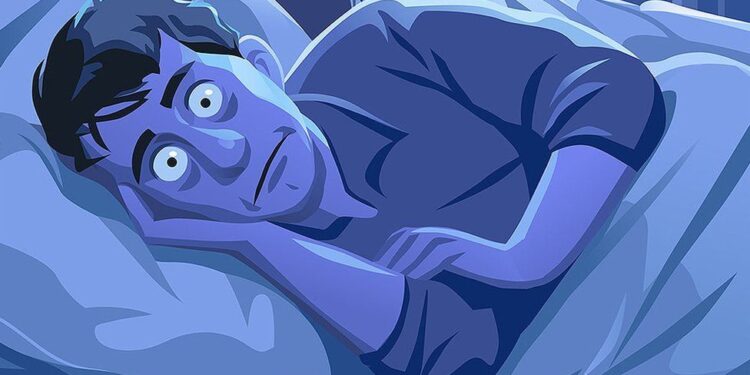The most frequent sleep issue in the general population is insomnia. When it becomes chronic, it can have a significant impact on people’s health, job performance, and quality of life. As a result, we’ll go through what insomnia is, what causes it, and what treatments are available to combat it, including CBD treatments for insomnia.
What is insomnia?
Insomnia is defined as a change in the conciliation, duration, consolidation, or quality of sleep that happens despite the presence of conducive sleeping conditions and is accompanied by severe discomfort or worsening in the social, work, or academic environment, among other things.
- Daytime sleepiness and exhaustion are the most common symptoms of insomnia.
- Attention, concentration, learning, and memory issues.
- Having trouble falling asleep at night.
- Lack of sensation of relaxation after sleeping;
- Increased risk of making mistakes and having an accident.
- Getting up in the middle of the night.
- Getting up quite early.
Insomnia can be characterized as acute or chronic depending on how long it lasts. Sleep disturbance lasts from a few days to a few weeks in acute or short-term insomnia. Sleep issues arise three or more times a week for a minimum of three months in chronic or long-term insomnia.
Insomnia’s causes
A stressful incident or a shift in a person’s routine are common causes of acute sleeplessness. Instead, persistent insomnia is caused by a variety of reasons, including:
- Worries can keep the mind active late at night, making sleep difficult. Insomnia can also be caused by stressful or distressing circumstances.
- Time changes and trips Long commutes, night employment, or frequent shift shifts can produce jet lag, which can disrupt circadian rhythms (the changes the body goes through in a 24-hour cycle) and lead to insomnia.
- Poor sleeping habits. Sleep can be disrupted by irregular bedtime habits, naps, engaging in stimulating activities, and utilizing screens (computer, television, mobile phone, etc.) before going to bed.
- Eat a large lunch before going to bed. Much of the food might make lying down uncomfortable, making it harder to fall asleep.
- Disorders and diseases Cancer, diabetes, heart disease, asthma, hyperthyroidism, Parkinson’s disease, Alzheimer’s disease, anxiety, and depression are just a few of the diseases and disorders linked to insomnia.
- Some drugs. Some antidepressants, antihypertensives, and caffeine-containing drugs can interfere with sleep (eg, some anti-flu preparations).
- Caffeine, nicotine, and alcohol are all stimulants. Caffeine in coffee, tea, or mate, as well as nicotine in tobacco, are stimulants that can keep you awake at night. Alcohol, on the other hand, can make you drowsy and help you fall asleep, but it also inhibits you from reaching the deepest stages of sleep, causing you to wake up in the middle of the night.
- Old age. Changes in sleep habits, activity levels, health deterioration, and medication use all contribute to the occurrence of insomnia as people age.
Treatment for insomnia with CBD, treatments, and a healthy lifestyle
Currently, lifestyle changes, counselling, and pharmaceuticals are used to treat insomnia.
In terms of lifestyle, having good sleep habits is key, such as avoiding or limiting naps, exercising regularly (avoiding doing so right before bed), avoiding coffee, nicotine, and alcohol as much as possible, and so on.
In terms of therapy, cognitive-behavioral therapy (CBT) has been shown to help decrease anxiety linked with insomnia, as well as negative thoughts that make falling asleep difficult.
Finally, there are numerous drugs for insomnia, most of which must be prescribed by a physician. However, others do not require a prescription, such as doxylamine-based formulations, which are used to treat occasional insomnia by lowering the time it takes to fall asleep and increasing the depth and length of sleep.
In conclusion, insomnia is a disorder that can severely disrupt the lives of those who suffer from it. Knowing the causes and solutions can help you deal with this health issue. People who suffer from chronic insomnia should contact a doctor, especially if the insomnia is caused by an illness or medicine.
How to use homeopathy to treat low back pain
They have had to adjust to an uncommon context because of the COVID-19 pandemic in these times when we are forced to live our habits. Work is one of the areas of life that has been particularly affected for thousands of individuals, with the rise of teleworking on a scale never seen before.
In this setting, many people have not had, and continue to have, access to a well-equipped work environment from all perspectives. Shared workspace, poorly fitted furnishings, and unpredictable schedules are some of the most common challenges that many people face in their new work position.
All of this, along with a more sedentary lifestyle due to the constraints in general mobility imposed by these periods, can lead to back problems, the most common of which is low back discomfort.
Homeopathy can be a useful ally in preventing and treating these ailments, in addition to adopting a proper back position and not avoiding physical activity as much as possible.
What does low back discomfort entail?
Lumbago is a painful condition that affects the lumbar or low back region. It can range in severity from mild to moderate discomfort that limits but does not prevent everyday activities to severe pain that renders the patient immobile.
Low back discomfort can sometimes be accompanied by pain that runs down the length of the thigh. Which is frequently due to sciatic nerve involvement. Sciatica.
Low back pain is the most prevalent musculoskeletal condition in those under 45 years old. And the most common cause of activity limitation in people over 65 years old.
Also, Low back pain affects 80 percent of the population at some time in their lives. Making it the most common reason for primary care visits for musculoskeletal pain. And the second leading cause of absenteeism.
Low back pain causes
The majority of patients with low back discomfort do not have an injury. The pain can be caused by rheumatic disorders, trauma, or other conditions that impact the area, but the most common cause is poor posture at work or overload from doing a physical activity incorrectly.
Low back pain episodes are usually brief, although there may be relapses that necessitate certification.
Homeopathy can help you.
The most important thing in medicine, and in life in general, is to prevent. And this is especially true when it comes to lower back pain. And everyday exercise, particularly abdominal and lumbar strengthening, is recommended for this.
Swimming on the back is one of the most suggested sports for toning up and preventing muscular injuries in the back area, but any physical activity that is well-directed and tailored to the individual’s needs can be beneficial in preserving the health of our lumbar region.
When pain first occurs, we’ve found that combining manual therapies like Osteopathy. Homeopathic medicines is an effective therapy choice for low back pain. Both in the short and long term.
Moreover
ARNICA, CUPRUM METALLICUM, and MAGNESIA PHOSPHORICA are all homeopathic remedies. They can help with general pain, especially if the low back pain is caused by overexertion or trauma. If the sensation of contracture and spasm predominates. BRYONIA if the pain is so severe that the patient cannot move, or RHUS TOXICODENDRON in patients. Who, on the other hand, the only thing that relieves their pain is a permanent change of posture. These are just a few of the options available to us when treating lumbar pain with homeopathy.
To avoid relapses, it’s critical to maintain good posture, especially. When doing things like studying or working, where we’ll be spending a lot of time. And, of course, maintain a well-directed and maintained physical activity that is tailored to each individual’s traits and preferences.
In my experience, frequent maintenance of your back with manual rebalancing techniques. Such as osteopathy is strongly advised in addition to everything else mentioned. Especially in persons who have a tendency to suffer from recurrent low back discomfort. In the prevention and treatment of low back pain. A combination of postural care, frequent and well-directed exercise, and homeopathy. And manual medical techniques such as osteopathy will be effective.






